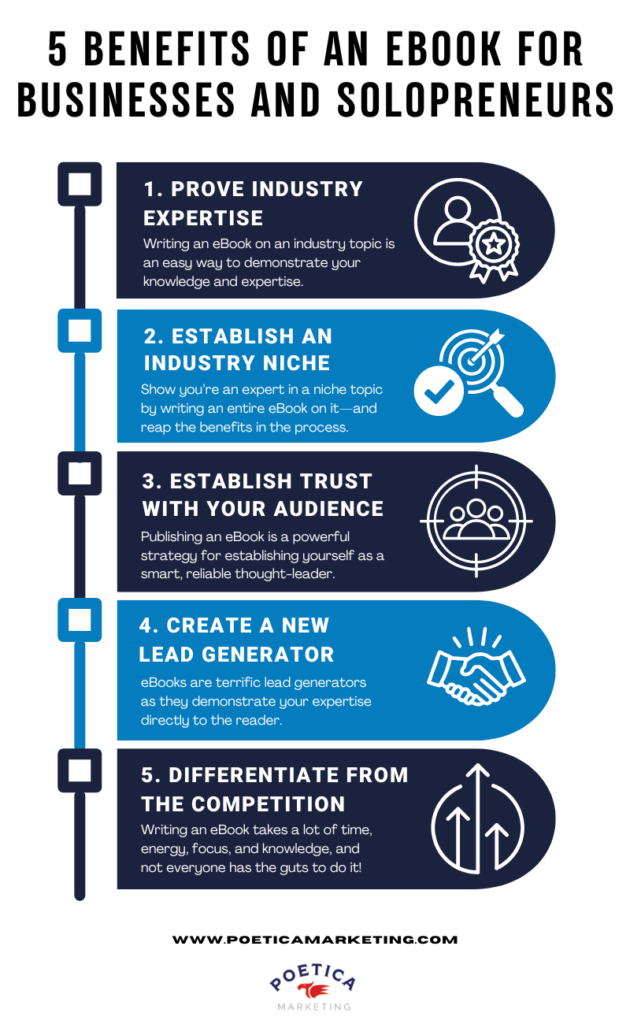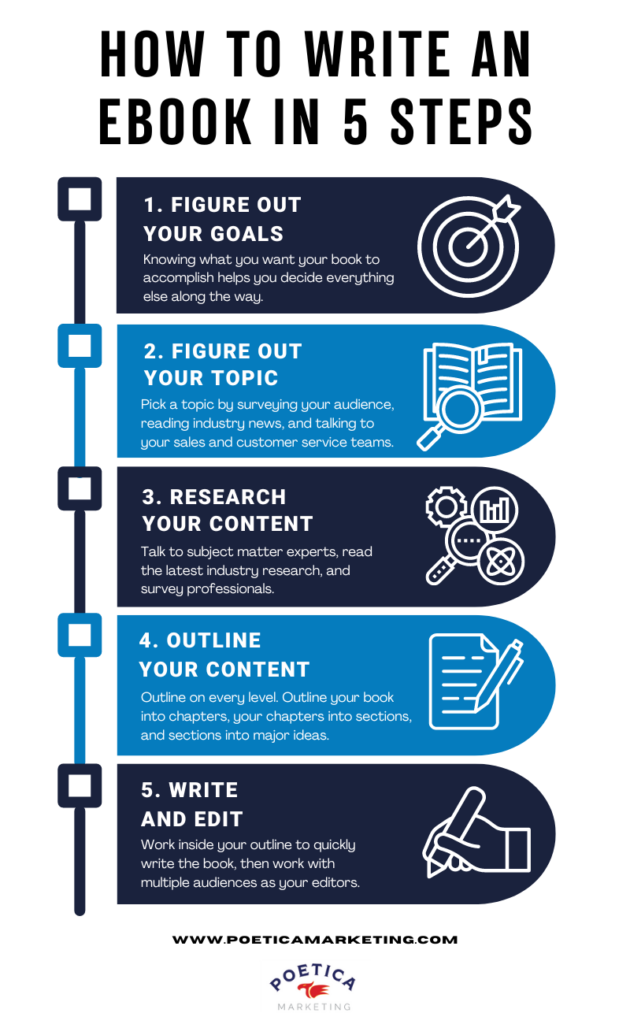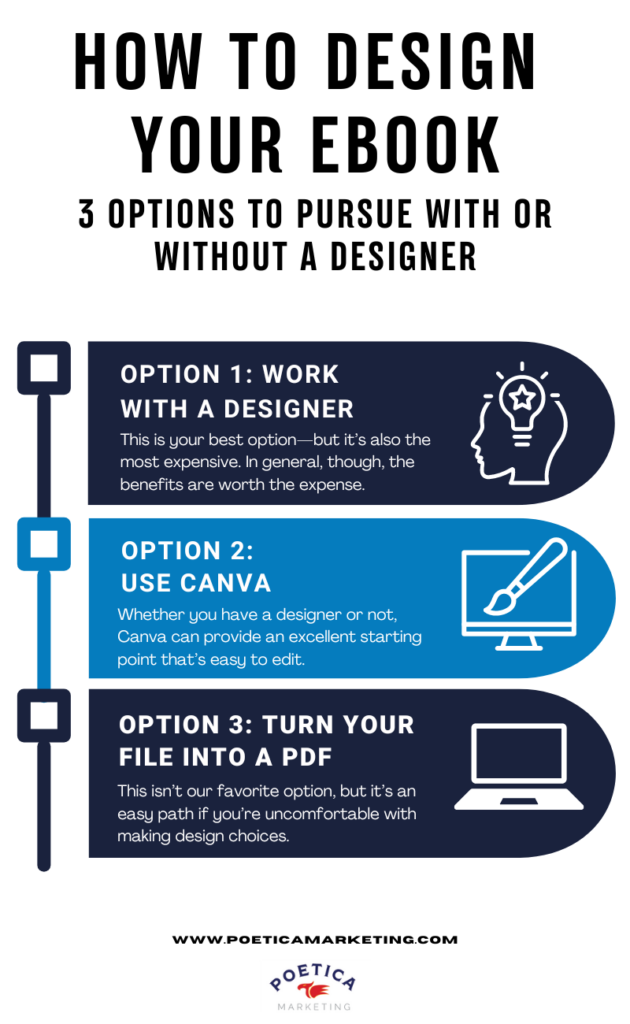How to Create An eBook for Lead Generation
With a name like “Poetica,” it’s probably no surprise we love eBooks.
“Poetica” comes from the phrase “Ars Poetica,” which translates to “the art of poetry,” or, more loosely, “the art of language.” We love reading, writing, and content marketing, and eBooks are an important part of that.
But we’ll be the first to say the process of writing, publishing, and promoting an eBook takes a lot of work and coordination.
That’s why we’re sharing our expertise!
Continue reading to get our full guide on how to write an eBook, or use our table of contents to get started.
Table of Contents
What Is An eBook?
What Are the Benefits of An eBook for Businesses?
How to Write An eBook
How to Design Your eBook
How to Create An eBook Landing Page
How to Promote Your eBook for Lead Generation
Get Started With Your eBook
What Is An eBook?
An eBook is an electronic book, usually delivered in PDF, ePub, or mobi format.
eBooks are great for companies, experts, and solopreneurs because they’re cheaper to produce and share than physical books, they can be quickly edited and updated, and they’re easy to self-publish and release through your own website.

What Are the Benefits of An eBook for Businesses and Solopreneurs?
Writing and publishing your own eBook can provide a powerful boost to your business by unlocking five powerful benefits:
1. Writing an eBook proves your industry expertise. You can’t write 20, 50, 100, or 200 pages about a single topic if you’re not an expert in it! An eBook shows you’re a subject matter expert and someone worth working with.
2. Writing an eBook helps you establish your industry niche. Most eBooks are about incredibly specific topics, and writing about a single topic at length can help you deepen your ties within a single market.
3. Writing an eBook helps you establish trust with your target audience. Want to make your sales process easier? Help people know, like, and trust you before you ever meet. By giving them a look into your mind through your eBook, you can establish credibility that makes every sales opportunity an easier conversion.
Related Reading: How to Increase Sales With Blogging
4. eBooks are great lead generators. An eBook can become a powerful lead generator. Ideally, the people reading it are exactly the people you want to do business with, and every page is an opportunity to prove that you’re an excellent subject matter expert and someone worth paying.
5. eBooks help separate you from the competition. It takes a lot of dedicated time, focus, and expertise to write an eBook, and not everyone has the drive, resources, or knowledge to do that. By writing and promoting your own eBook, you’ll stand out from the competition with a timeless piece of content that can generate new leads for years to come.

How to Write An eBook
Writing an eBook is a major step in your overall marketing strategy. Here’s how to go about it:
1. Figure Out Your Goals
What do you want your eBook to do?
Should it send you to the top of a best-seller list?
Should it help you break into a new market?
Should it help you separate your brand from the competition?
Knowing what you want your book to accomplish helps you decide everything else along the way.
Whenever you’re unsure of what to do next, reflect on your goals!
2. Figure Out Your Topic
Not every eBook is a success. And the biggest reason we see eBooks fail is because someone decided to write about a topic no one asked for.
A few ways to pick your next eBook topic:
- Survey your target audience
- Read the latest industry research
- Ask your sales team and customer service reps about the most pressing questions and inquiries they receive
The next great eBook topic is out there; you just have to find it!
Related Reading: 10 Quick Ways to Come Up With New Blog Topics Right Now
3. Research Your Content
You might feel like you already have enough content to write your eBook on your own, but don’t forget to reach out for additional ideas, material, and perspectives. A few tips:
- Talk to subject matter experts both in and outside of your field—possibly even on your own team or within your company.
- Read the latest research within your industry—and don’t forget to check out related scientific journals. Check out our notes below for recommendations!
- Survey your target audience by chatting with your clients and other people you’d like to read your book.
As a bonus, here are two more big research tips:
- Don’t over-rely on AI. AI has been known to make critical errors, and ChatGPT even comes with a warning: ChatGPT can make mistakes. Check important info.
- Use the smart section of Google. Did you know Google has a section dedicated to peer-reviewed research? Check out Google Scholar for some great research articles.
Related Reading: 3 Pros And Cons of ChatGPT In Content Marketing
4. Outline Your Content
If you’ve never written a book before, it can feel like a gargantuan task. Heck, even if you have written one before, it’s still a big task!
Start by outlining—and outline on every level:
- Outline your book into chapters.
- Outline those chapters into sections.
- Outline those sections into major ideas.
From there, you’re ready to start writing!
5. Write & Edit
For many companies, actually writing the content is the most laborious part of the eBook process—but it also happens to be our favorite.
Our recommendation: Work inside your outline to start fleshing out your content (we did exactly that for this blog post).
And once you have your content written, rewrite it. It’s a tough thing to do, but a first draft is rarely ready to publish.
Most books take multiple revisions to get them right. Here’s a perfect example: Anthony Burgess famously claimed to have rewritten A Clockwork Orange approximately 50 times before he was ready to publish it.
Great writing takes time.
And then it takes great editing. A few editing recommendations:
- Use spellcheck. Yes, this one is obvious, but it’s worth emphasizing: Use spellcheck. It’s your first line of defense against annoying spelling errors.
- Use Grammarly. No, we’re not sponsored by Grammarly, but we’re avid users of it at Poetica Marketing. Grammarly gives you an extra advantage over spellcheck because it’s superior at spotting grammatical issues, and it can help you tighten your writing.
- Work with multiple editors. While you never want to have “too many cooks in the kitchen,” you should get multiple perspectives on your eBook, including:
- A team member who can check your content.
- At least two trusted members of your target audience who can let you know if they still have questions after reading through any of your sections.

How to Design Your eBook
Now that your copy is perfect, it’s time to design your book. That means taking a close look at:
- Your cover
- Your page layout
- Any charts or graphics
- Captions for your charts or graphics
- Your font choices
All of this can be especially challenging if you’ve never tried it before. You have a few popular options:
Option 1: Work With A Designer
This is your best option—but it’s also the most expensive. In general, though, the benefits are worth the expense.
Working with an experienced designer means you’ll get better visual results for your readers and target audience, and a better appearance results in great trust—and better sales.
Option 2: Use Canva
Whether you have a designer or not, Canva can provide an excellent starting point for your layout, and you can quickly make edits to the cover, layout, font choices, and more. We even used Canva to develop our Events On A Budget eBook.
Canva provides a convenient shortcut in many design factors, and it can dramatically save on costs.
Option 3: Turn Your Google Doc or Word Doc into a PDF (Not Recommended)
This isn’t our favorite recommendation, but it is an option. If you really struggle with design and layout, you can simply convert your Google Doc or Word Doc into a PDF. Unfortunately, this doesn’t give you the same pizzazz as something a designer creates in InDesign or Canva. However, there are a few clever ways to jazz up a traditional PDF.
For our marketing eBook The Strategic Marketer, we merged the PDF file of our page copy with a PDF file of our cover (which was originally created in InDesign), giving us a great first impression without worrying about reformatting our page content.
How to Create An eBook Landing Page
In our copywriting workshop (contact us to book a session for your team or read our copywriting mastermind blog), we provide a simple formula for landing pages:
- Engaging, Value-Driven Headline
- Powerful Kicker
- CTA / Form
- Customer Review / Trust Signal
- Case Study / Benefits List / Stat / Story
- CTA / Form
- Additional Case Study / Benefits List / Stat / Story
Of course, there are many ways to write an effective landing page, so experiment until you find a strategy that works for you.
With that in mind, let’s focus on the non-negotiables—those things that are essential for your landing page:
- Focus on value. The more you emphasize the benefits of downloading your eBook, the more likely you are to get downloads.
- Include a form. You can give your eBook away without including a monetary cost, but always require an email address or some other form of communication.
- Tie the form into your email tool. By tying the form into MailChimp or Flodesk or another email tool, you can automatically add the lead’s contact information to a chosen list and even place them in a drip campaign without doing any extra work.
How to Promote Your eBook for Lead Generation
Congratulations! You’ve written your book! But now that the heavy lifting is done, it’s time to promote it.
Do you know where to start?
Here are a few opportunities to consider:
1. Your Social Media Channels
Your business and personal accounts are great places to share your eBook landing page.
And don’t feel like you need to promote the entire book at once. Offer previews of your favorite sections or chapters to get people interested, then push them to the landing page to learn more.
2. Email
If you have an email list of clients, prospects, and industry contacts, you have an audience that’s likely interested in learning about your eBook.
As with social media, you don’t have to stop with a single, broad statement about the book. Instead, consider a full campaign that drips out tiny pieces of interesting, compelling ideas that encourage a full read (and download).
3. Your Website
Your website is a terrific place to promote your eBook. In addition to your landing page, you can also push your eBook through:
- Your blog. In fact, you could promote it over multiple blogs. Tell the process of your research. Share some of the ideas that didn’t make the cut. Offer a preview of a certain chapter. There are so many opportunities! And don’t forget to include links to your landing page in previous blogs about related topics!
- Banners. Drop a banner into your homepage, either with a pop-up or directly into the site architecture. Remember: People will only look at the offer for a moment, so pay attention to your imagery and copy.
- Your product & service pages. Share your eBook on relevant product/service pages to build trust as people are checking out the value your brand can deliver. As an example, check out our eBook plug on our Content Marketing page!
3. Press Release
Done correctly, a new eBook is a big deal, and it’s potentially even newsworthy! Write a press release and distribute it to local news editors, local author communities, relevant industry publications, and other sites that may be interested.
Remember: You might need to reach out multiple times before your email or message is noticed. That’s totally normal and OK!
4. Podcasts & Interviews
A new eBook can get your foot in the door on podcasts and other news sites as a guest, and you can use that appearance to plug your book and expertise.
Plus, you can then share the interview on social media, through email, and on your blog as additional promotional content
5. Lead Nurture Campaign
After you receive a download for your eBook, you can use the contact information you’ve collected to remain in touch with your lead.
Reach out on a regular basis to continue emphasizing the value and expertise your company delivers, and work to convert them into a paying customer.
Get Started With Your eBook
If you’re ready to start writing your own eBook, have the heavy lifting done by Poetica Marketing.
We’ll work with you to:
- Research the content.
- Write the eBook.
- Develop the layout.
- Build and execute your marketing strategy.
Get started today! Contact us to learn more.
